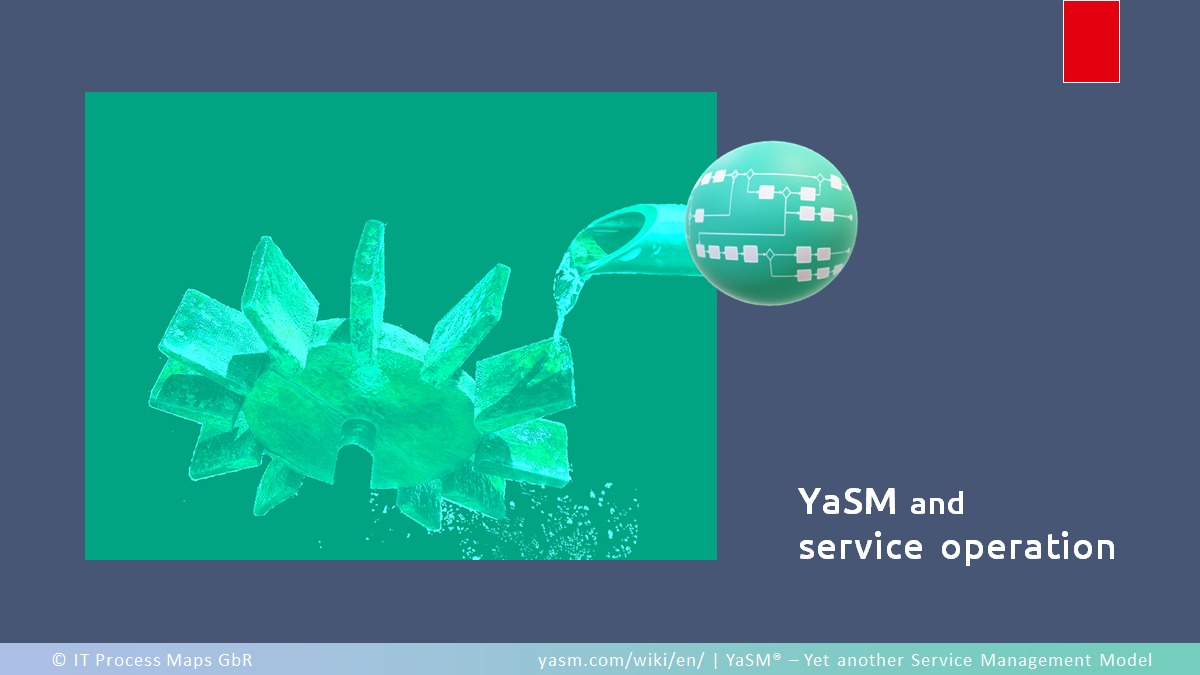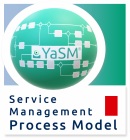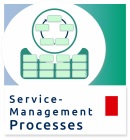Service Operation
The purpose of service operation is to 'coordinate and carry out the activities and processes required to deliver and manage services at agreed levels to business users and customers. It is also responsible for the ongoing management of the technology that is used to deliver and support the services' [1].

How to operate services in YaSM and the ITSM frameworks.
Service operation in the ITSM frameworks
Many ITSM practitioners are familiar with service operation as one of the five service lifecycle stages that have been introduced with ITIL v3. The ITIL v3 core publication about service operation describes it as the stage that accepts new or changed services from service transition once the test criteria have been met, and ensures that the services meet all of their agreed operational targets. Service operation collects all metrics defined in service design and provides reports and statistics to the next service lifecycle stage, continual service improvement.
Service operation as described in ITIL v3 includes five processes:
- Event management
- Incident management
- Request fulfilment
- Problem management
- Access management.
ITIL® 4 has dropped the service lifecycle concept in favor of a more holistic approach. ITIL v4 does no longer define specific processes that organizations should implement, but the familiar operational ITIL processes have found their way into ITIL 4 as "practices". Therefore, ITIL v4 refers to incident, problem and service request management as practices [2].
Other service management frameworks, such as CMMI-SVC®, USMBOK™ and COBIT®, also include processes for dealing with incidents and problems, although with slightly different names (in CMMI-SVC®, for instance, there's a process area named incident resolution and prevention).
VeriSM™ introduces the VeriSM model as "a service management operating model for an organization" [3]. VeriSM describes "high-level stages" for the development and provision of products and services. Two of these stages, "Provide" and "Respond", contain operational activities to deal with incidents, problems and service requests, although VeriSM uses the term "issue" instead of incident.
Service operation process in YaSM
Since the existing guidance on service operation is well established and generally accepted, the service operation process in YaSM is based on the guidance provided in ITIL® and other service management frameworks.
Inputs and outputs
As in ITIL, YaSM's service operation process starts once a service is implemented.
From the implementation stage, service operation receives an approved service definition that describes the properties of the service to be delivered, including the required service levels. This is a key input for service operation because the service definition sets clear targets for the responsible service owner and allows him or her to direct the operational activities accordingly.
Clearly defined service level targets are also necessary for producing meaningful service reports, which are essential inputs for the service improvement process.
Another important input to service operation is the service operation manual, which describes the activities required for operating the service, such as regular maintenance. In YaSM, that manual is created during the service implementation stage, so we can be sure all relevant information and operational guidance is available when a service goes live.
Key activities
What are the key activities of service operation?
YaSM describes two types of activities in a number of sub-processes:
- monitoring the service and producing service quality reports
- resolving incidents, service requests and problems
The processes in YaSM for resolving incidents, fulfilling service requests and dealing with problems will look familiar to anyone with a background in ITIL or any other popular service management framework.
To keep the processes practical and avoid duplication, YaSM combines incident and service request management into one process, because the two practices are in fact very similar and contain many identical activities (those who are familiar with ITIL v2 will remember that before the advent of ITIL v3, service requests were fulfilled through the incident management process - and it worked very well).
In addition, there are usually many routine operational tasks that have to be carried out as part of service operation. But YaSM, like the other service management frameworks, cannot describe these activities in great detail because precisely what needs to be done will depend on the type of service and infrastructure used.
IT service providers, for example, may run applications and systems from different vendors, so it's hard to give any detailed advice that works for everyone. And the routine operational activities of, say, a restaurant chain will be quite different from those of a provider of legal services.
Against this background, YaSM provides general guidance, such as "Perform routine maintenance on technical infrastructure", "Create regular data backups", etc. This guidance can be used as a starting point for creating detailed operation manuals and work instructions, as necessary.
You can find a complete description of the service operation process according to YaSM here in the YaSM Wiki, including definitions of the sub-processes, details about the process outputs, and a RACI matrix.
Video

In this video you'll learn more about why service providers need a consistent, professional approach to managing incidents and service requests.
(From our video series "The simple principles of good service management").
Watch the video:
⯈ Don't leave customer support to luck (10:27 min.)
Related pages
- YaSM service management processes ➔ LP4: Operate the services
- ITIL 4 practices and YaSM processes
- YaSM and ITIL V3 ➔ YaSM vs. ITIL service operation
External links and references
[a] IT Process Wiki - ITIL Service Operation. -- S. Kempter: IT Process Wiki, "ITIL service operation". - IT Process Maps; Lindau (Bodensee), Germany.
[1] The Cabinet Office: ITIL® Service Operation (2011 Edition). - The Stationery Office; London, UK.
[2] AXELOS: ITIL® Foundation, ITIL 4 Edition. - The Stationery Office; Norwich, UK, 2019.
[3] IFDC (International Foundation for Digital Competences) (2017). VeriSM™ - A Service Management Approach for the Digital Age. Zaltbommel, Netherlands: Van Haren Publishing.
By: Stefan Kempter ![]() , IT Process Maps.
, IT Process Maps.
Service operation in the ITSM frameworks › Service operation process in YaSM › Inputs and outputs › Key activities › Video





